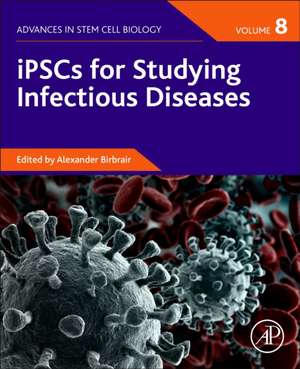iPSCs for Studying Infectious Diseases: Advances in Stem Cell Biology
Editat de Alexander Birbrairen Limba Engleză Paperback – 8 iun 2021
Somatic cells can be reprogrammed into induced pluripotent stem cells by the expression of specific transcription factors. These cells have been transforming biomedical research over the last 15 years. This volume will address the advances in research of how induced pluripotent stem cells are being used for treatment of different infectious diseases, such as corona virus, coxsackievirus, salmonella infection, influenza virus and much more.
The volume is written for researchers and scientists in stem cell therapy, cell biology, regenerative medicine and organ transplantation; and is contributed by world-renowned authors in the field.
- Provides overview of the fast-moving field of stem cell biology and function, regenerative medicine, and therapeutics
- Covers infections by several pathogens, such as coronavirus, coxsackievirus, influenza virus, herpes simplex virus 1, T. gondii, T. cruzi, S. agalactiae, N. meningitidis, Salmonella, and more
- Is contributed by world-renowned experts in the field
Din seria Advances in Stem Cell Biology
- 28%
 Preț: 797.64 lei
Preț: 797.64 lei - 27%
 Preț: 782.05 lei
Preț: 782.05 lei - 23%
 Preț: 796.11 lei
Preț: 796.11 lei - 24%
 Preț: 785.01 lei
Preț: 785.01 lei - 24%
 Preț: 786.68 lei
Preț: 786.68 lei - 22%
 Preț: 801.17 lei
Preț: 801.17 lei - 22%
 Preț: 798.16 lei
Preț: 798.16 lei - 22%
 Preț: 798.68 lei
Preț: 798.68 lei - 9%
 Preț: 800.27 lei
Preț: 800.27 lei - 9%
 Preț: 797.78 lei
Preț: 797.78 lei - 23%
 Preț: 797.52 lei
Preț: 797.52 lei - 22%
 Preț: 798.16 lei
Preț: 798.16 lei - 23%
 Preț: 801.44 lei
Preț: 801.44 lei - 23%
 Preț: 796.37 lei
Preț: 796.37 lei - 22%
 Preț: 801.55 lei
Preț: 801.55 lei - 9%
 Preț: 801.36 lei
Preț: 801.36 lei
Preț: 798.02 lei
Preț vechi: 1029.65 lei
-22% Nou
Puncte Express: 1197
Preț estimativ în valută:
152.70€ • 166.39$ • 128.67£
152.70€ • 166.39$ • 128.67£
Carte indisponibilă temporar
Doresc să fiu notificat când acest titlu va fi disponibil:
Se trimite...
Preluare comenzi: 021 569.72.76
Specificații
ISBN-13: 9780128238080
ISBN-10: 0128238089
Pagini: 332
Ilustrații: 60 illustrations (40 in full color)
Dimensiuni: 191 x 235 x 23 mm
Editura: ELSEVIER SCIENCE
Seria Advances in Stem Cell Biology
ISBN-10: 0128238089
Pagini: 332
Ilustrații: 60 illustrations (40 in full color)
Dimensiuni: 191 x 235 x 23 mm
Editura: ELSEVIER SCIENCE
Seria Advances in Stem Cell Biology
Public țintă
Researchers and scientists in stem cell therapy, cell biology, regenerative medicine, and organ transplantation Graduate and undergraduate students in the above fieldsCuprins
1. The Application of iPSCs to Questions in Virology: A Historical Perspective
2. Transplantation Of iPSCs -Derived Neural Progenitor Cells Promotes Clinical Recovery and Repair in Response to Murine Coronavirus-Induced Neurologic Disease
3. iPSCs For Modeling Influenza Infection
4. Human Induced Pluripotent Stem Cells for Modeling of Herpes Simplex Virus 1 Infections
5. iPSCs For Modeling Coxsackievirus Infection
6. Pluripotent Stem-Cells-Derived Oligodendrocytes progenitors to Models for Theiler’s Murine Encephalomyelitis Virus and Other Viruses
7. iPSCs for Modeling of Hepatotropic Pathogen Infections
8. Use of Human Induced Pluripotent Stem Cells (hiPSC)-Derived Neuronal Models to Study the Neuropathogenesis of the Protozoan Parasite, Toxoplasma Gondii
9. iPSCs For Modelling Chagas Disease
10. Induced Pluripotent Stem-Cell Derived Brain Endothelial Cells to Study Host-Pathogen Interactions with the Bacterial Pathogens Streptococcus agalactiae And Neisseria meningitidis
11. Human Induced Pluripotent Stem Cells for Modeling of Salmonella Infection
2. Transplantation Of iPSCs -Derived Neural Progenitor Cells Promotes Clinical Recovery and Repair in Response to Murine Coronavirus-Induced Neurologic Disease
3. iPSCs For Modeling Influenza Infection
4. Human Induced Pluripotent Stem Cells for Modeling of Herpes Simplex Virus 1 Infections
5. iPSCs For Modeling Coxsackievirus Infection
6. Pluripotent Stem-Cells-Derived Oligodendrocytes progenitors to Models for Theiler’s Murine Encephalomyelitis Virus and Other Viruses
7. iPSCs for Modeling of Hepatotropic Pathogen Infections
8. Use of Human Induced Pluripotent Stem Cells (hiPSC)-Derived Neuronal Models to Study the Neuropathogenesis of the Protozoan Parasite, Toxoplasma Gondii
9. iPSCs For Modelling Chagas Disease
10. Induced Pluripotent Stem-Cell Derived Brain Endothelial Cells to Study Host-Pathogen Interactions with the Bacterial Pathogens Streptococcus agalactiae And Neisseria meningitidis
11. Human Induced Pluripotent Stem Cells for Modeling of Salmonella Infection
